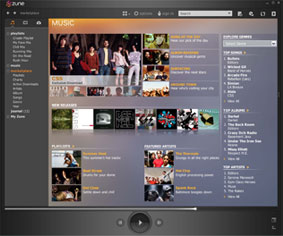 The writing’s on the wall: DRM for music downloads is deader than the eight track. Okay, actually, that’s not fair: the eight track was relatively good technology.
The writing’s on the wall: DRM for music downloads is deader than the eight track. Okay, actually, that’s not fair: the eight track was relatively good technology.
Just two weeks after Amazon launched their own DRM-free music store, Microsoft is jumping on the bandwagon. DRM won’t be gone completely from the Zune store, but there will be hundreds of thousands of DRM-free tracks going live, apparently in November with the release of a new store and new players. That’s a major departure, given that Microsoft built its Zune and PlaysForSure platforms around DRM, and introduced significant new DRM features in Vista. Normally, I don’t like to quote press releases, but I’ll give my friends at the Digital Freedom Campaign a chance for some deserved gloating:
“The industry standard has shifted in the past six months and the tide has turned in favor of consumers,” Maura Corbett, a spokesperson for the Digital Freedom Campaign said. “The number of digital music retailers offering DRM-free music will soon out number those that do not, and consumers will soon live in a world where they can listen to legally purchased music when, how, and where they want. We congratulate Microsoft for joining the growing number of retailers and labels that have realized the best way to increase the sales of digital music, is to listen to their customers.”
Actually, I’ll argue one point. The number of digital music retailers offering DRM-free music already outnumbers those that don’t. There’s iTunes (via Universal and iTunes Plus), eMusic, Wal-Mart (though with IE Windows-only downloads, for no very good reason), Amazon (which even has a Mac downloader and automatic iTunes integration), and handfuls of downloads on all the major music websites and services.
And then there are the “indie”/niche music stores: Other Music, Beatport, Dance Tracks Digital, Bleep, yoosic, finetunes, 3 beat digital, Thrill music, etc., etc. (See a whole bunch of other examples in Where Do You Get Your DRM-Free Music?)
Also this week: Radiohead dumped their label, announced they’d self-release as a DRM-free download, and let people pay what they want. I’ve been meaning to write that up — thanks for everyone who wrote in — but am sort of rendered speechless by the sensation of the online music world finally turning into what it should have been at the beginning. Clearly, Radiohead’s path works for them and may not work for everyone — if anything, this emphasizes the real significance of labels for promotion, and not so much for the broken distribution model that ultimately punished so many artists in the past. But the trend is early toward heterogeneous music sources, and choices for artists to do what makes sense for them.
Ultimately, this trend should be fantastic for diversity of music and stores alike. Just because big stores like iTunes and the Zune store are going DRM-free doesn’t necessarily mean they’ll crush smaller stores. On the contrary, the pressure is now on labels to embrace digital distribution and DRM-free downloads, which could be a real boon to smaller stores building their catalogs.
Meanwhile, video DRM is very much alive, unfortunately; TV, for instance, seems to actually be trending toward more DRM. But that’s another story, and maybe music will eventually lead video in the same direction once the video business model is more secure. (Why is it we can’t watch streaming TV with ads, for instance?)
But, years after the Napster legal implosion, it seems online music is finally coming around to access and choice, with a business model to support it.
Previously:
Free: Find DRM-Free Music, Make Glitchy Sounds, Built in Max
As Other Music, Others Embrace Downloads, is Big, DRM-Laden Online Music Out? (Okay, answer = yes.)
Where Do You Get Your DRM-Free Music?